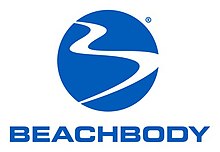The Beachbody Company
 | |
| Company type | Private |
|---|---|
| Industry |
|
| Founded | Santa Monica, California (1998) |
| Founders | Carl Daikeler Jon Congdon |
| Headquarters | , United States |
Area served | Direct: US, Canada, U.K. (Beginning 2017) Indirect; worldwide |
| Products |
|
| Website | beachbody |
Beachbody LLC is a privately-held American multi-level marketing company[1] that uses direct response infomercials,[2] e-commerce, and individual sales consultants to sell home-exercise videos and dietary supplements. Beachbody's programs include Morning Meltdown 100 and 80 Day Obsession along with products like Shakeology, a low-calorie liquid powder containing "superfoods".[2][3] The company was founded in 1998 in Santa Monica, California.[3]
Team Beachbody
Team Beachbody encourages members of the general public to enroll as "coaches". These customers-turned-salespeople register online as a "coach" and sell fitness packages using Beachbody products and programs including workout DVDs, food supplements and meal plans and in turn earning up to 25% commission[4] for each sale.[5] Carl Daikeler, a co-founder described coaches as serving as "walking billboards and salespeople who want to help their family and friends..."[1] and that the "average lifespan" of a coach is three months. In 2013, CNN reported that within two years of Team Beachbody's launch, sales of the parent company's products rose more than 60%.[6]
An article by Michelle Ruiz for Cosmopolitan's website in 2015 reports that the "pyramid setup" garners criticism from some who call Team BeachBody a "scheme" and that anyone can register online as a coach. The article also quotes Marion Nestle PhD, a professor of nutrition and food studies at New York University, as saying "It never ceases to amaze me that anyone would fall for anything like this. ... It's about making money."[5]
An article in The Philadelphia Inquirer by Anna Orso in 2018 profiles Team Beachbody coaches and reports that coaches earned an average of $2,600 per year (not accounting for expenses) and that more than half of all coaches earn nothing. The company claimed that their pyramid-like sales structure is not an illegal pyramid scheme.[4][7]
Products and programs
The company introduced a video on demand streaming subscription service known as Beachbody On Demand in 2015 with a library of at-home workouts from programs such as Insanity and P90X.[8] According to the CEO, the company's board was hesitant to offer all of its workout DVDs for a single subscription rate.[2]
Beachbody sells nutritional products such as Shakeology and Beachbar.[9]
Its programs include Morning Meltdown 100, 80 Day Obsession, LIIFT4, 21 Day Fix and Insanity.[10] P90X, or Power 90 Extreme, is a commercial home exercise regimen created by Tony Horton in 2005 and was developed as a successor to the program called "Power 90". It consists of a training program that uses cross-training and periodization, combined with a nutrition and dietary supplement plan.[11] It was heavily marketed through infomercials and celebrity endorsements.[12][verification needed]
Controversy
Between June and November 2017, advertising watchdog organization Truth in Advertising found that Beachbody distributors were making false and unsubstantiated income claims to promote the company’s business opportunity.[13] The FTC has stated that 99.6% of all MLM participants will lose money, after factoring in the costs to join.[14]
In 2017, Beachbody agreed to pay $3.6 million to settle a lawsuit from the city of Santa Monica over automatic credit card renewals. It was alleged that Beachbody was charging its customers’ credit cards on an automatic, recurring basis without the required written consent of those customers.[15]
References
- ^ a b Rovell, Darren (January 31, 2011). "Beachbody Grows Exponentially Thanks To Network Marketing". CNBC. Archived from the original on October 13, 2012. Retrieved April 1, 2012.
- ^ a b c Debter, Lauren (April 10, 2018). "Inside Beachbody's Billion-Dollar Fat Burning Empire". Forbes.
- ^ a b Diana Olick, CNBC. "Get really fit by hitting the basement." May 27, 2016. Retrieved Sep 5, 2018.
- ^ a b Orso, Anna (May 21, 2018). "Behind those before-and-after Instagram photos: Money, marketing and meal replacements". The Philadelphia Inquirer.
- ^ a b Michelle Ruiz (July 22, 2015). "This Cultish Workout Is All Over Your Social Media Feeds — But Is It Legit?". cosmopolitan.com.
- ^ Hicken, Melanie (January 9, 2013). "The money behind Herbalife, Mary Kay and others". CNNMoney.
- ^ "Statement of Independent Coach Earnings December 29, 2016 – December 27, 2017 1" (PDF). Beachbody.com. Retrieved March 5, 2019.
- ^ Smith, Rob. "Beachbody CEO: file sharing and piracy 'costs us millions'". finance.yahoo.com. Retrieved January 8, 2021.
- ^ Day, Hannah; Jones, as told to Alexis (November 5, 2019). "At 237 Lbs., I Was Embarrassed To Go To The Gym. So I Did An At-Home BeachBody Program—And Lost 117 Lbs". Women's Health. Retrieved January 8, 2021.
- ^ Malik, Naureen S (March 24, 2020). "Almost Overnight, the $100 Billion Fitness Industry Goes Virtual". Bloomberg.com. Retrieved January 8, 2021.
- ^ "What is the P90X workout? Rep. Paul Ryan credits Tony Horton fitness routine for keeping in shape". NY Daily News. August 15, 2012. Retrieved August 15, 2014.
- ^ Townsend, Matt (September 7, 2012). "Ripple Effect: Beachbody LLC flexing its muscles following success of P90X program". Chicago Tribune.
- ^ TINA (December 18, 2017). "TEAM BEACHBODY INCOME CLAIMS DATABASE". Truth in Advertising. Retrieved September 15, 2020.
- ^ Jon M. Taylor, MBA, Ph.D. "Appendix 7E: MLM Profit and loss rates vs. various income options" (PDF). FTC. Retrieved September 15, 2020.
{{cite web}}: CS1 maint: multiple names: authors list (link) - ^ Howard Fine (August 29, 2017). "Beachbody Agrees to Pay $3.6 Million to Settle Case Over Automatic Credit Card Renewals". Los Angeles Business Journal. Retrieved September 15, 2020.
